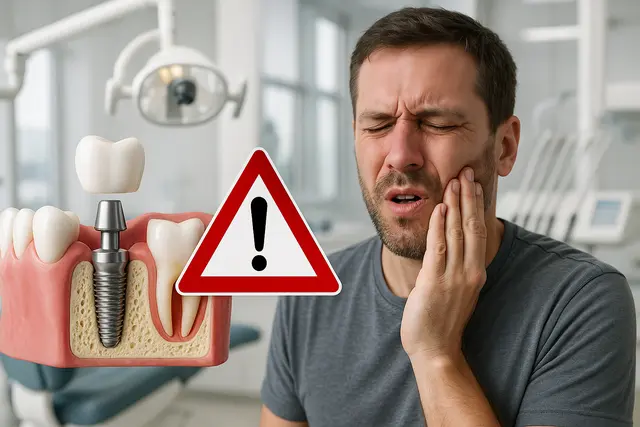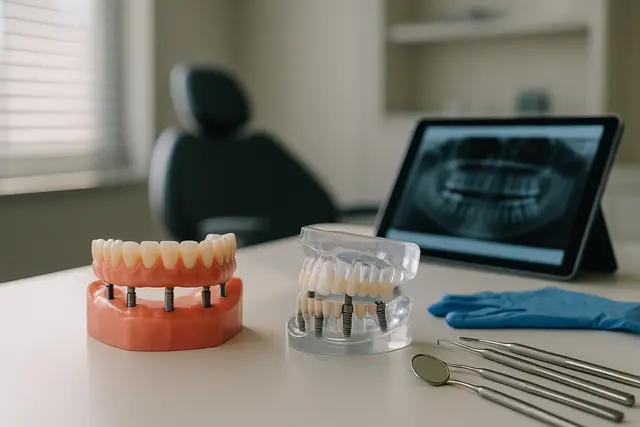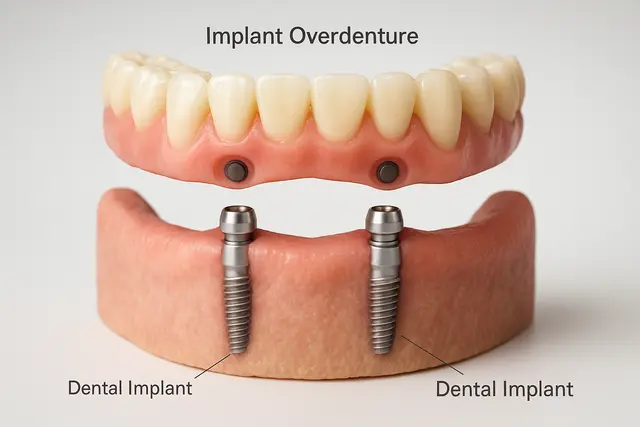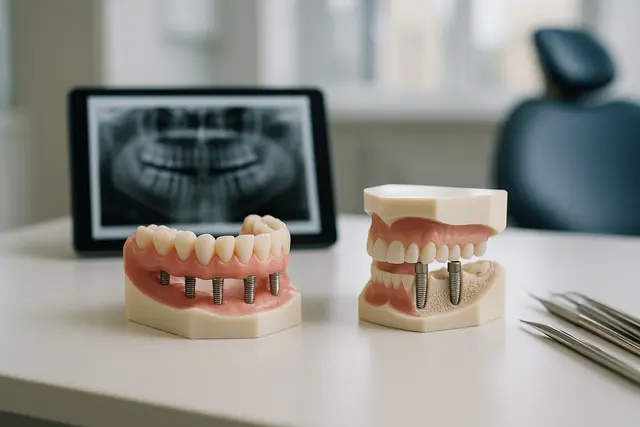Prosthodontics
5 min read
Oct 09, 2025
Top 5 Long-Term Risks of Dental Implants and How to Avoid Them
Thinking about getting dental implants? While they’re a top-tier solution for missing teeth, it’s important to understand that, like any surgical procedure, they come with potential risks. Knowing what to expect and how to minimize complications can make all the difference in ensuring your implant lasts for the long haul.

Dental implants are often hailed as the MVP of tooth replacement. They look great, feel natural, and with proper care, can last decades. But like any surgery, dental implant procedures aren't risk-free. If you're considering getting dental implants or already have them, it’s smart to know what could go wrong in the long run, and more importantly, how to prevent it.
Here are the top 5 long-term risks of dental implants and how to avoid them like a pro.
How Dental Implants Work and Why They’re So Popular
Let’s get this straight, dental implants are an effective way to replace missing teeth. A metal implant (usually titanium) is placed in your jawbone where the missing tooth root used to be. Over time, the bone fuses with the implant post, creating a stable base for an artificial tooth. This whole process is called dental implant surgery, and when done right, implants work beautifully.
The success of the implant depends on a few things: your overall health, bone density, implant placement, and of course, how well you follow post-surgery care instructions. Dental implants are safe and have a success rate of over 95% in most cases. Still, complications can occur.
1. Risk of Implant Failure and What Causes It
First up, let’s talk about the big one: implant failure. This is what happens when the implant doesn’t properly integrate with the bone or becomes loose over time. It’s heartbreaking, and expensive, when it happens.
Causes? It could be poor implant placement, bone loss, infection, smoking, or even biting down too hard too soon. Sometimes, the implant may fall out entirely or never feel quite stable.
How to avoid it:
Choose a skilled dentist with experience in implant dentistry.
Follow all post-op instructions like your smile depends on it (because it does).
Don’t skip regular dental checkups.
If you smoke, quitting will significantly reduce your risk of implant failure.
And yes, dental implants require solid dental care habits to last. Flossing is your friend.
2. Gum Disease Around the Implant Can Ruin Everything
Think your gums don’t matter once you’ve got a fake tooth in there? Think again. Gum disease is still very much a threat and can lead to complications of dental implants if not caught early.
In some cases, bacteria sneak into the tissue surrounding the implant, causing peri-implantitis. This nasty infection can destroy bone and soft tissue and lead to implant rejection.
How to avoid it:
Brush and floss daily, especially around the implant.
Use an antibacterial mouthwash recommended by your dentist.
Get regular dental checkups and cleanings.
Don’t ignore bleeding, swelling, or bad breath, those are red flags.
The implant may be metal, but your gums are still very much human and need love.
3. Nerve Damage or Tingling from Poor Implant Placement
Here’s where things can get tricky. If the implant is placed too close to a nerve (especially in the lower jaw), it can lead to numbness, tingling, or even pain that lasts. This is one of the potential side effects of dental implants that people don’t expect, but really should.
Some folks feel the tingling right after the implant procedure, while others notice it weeks later. Either way, it’s no fun.
How to avoid it:
Make sure you’re working with a dentist who uses advanced imaging for precise implant placement.
Ask questions about the angle of the implant and its proximity to nerves.
If you feel anything weird post-surgery, don’t tough it out, report it.
The goal is for your implant tooth to feel natural, not like a live wire in your jaw.
4. Sinus Trouble When Implants Are Placed in the Upper Jaw
Yep, your sinuses and your teeth are neighbors, and sometimes they don’t get along. When implants are placed in the upper jaw, especially the back area, they can push into the sinus cavity if there’s not enough bone.
This can cause chronic sinus infections, headaches, or that annoying pressure feeling. Sinus issues are one of the less common risks of dental implants but still worth mentioning.
How to avoid it:
Your dentist should evaluate bone volume in the upper jaw before surgery.
If bone is lacking, a sinus lift or bone graft may be needed before the implant can be placed.
Choose a dentist who doesn’t cut corners just to speed things up.
Sinus health matters. Trust us, you don’t want post-nasal drip with a side of implant complications.
5. Long-Term Bone Loss and Implant Failure Go Hand in Hand
Here’s something most people don’t realize: your jawbone is kind of like a muscle. If it’s not used, it shrinks. Missing teeth lead to bone loss, and if that continues around an implant, it can cause the implant to become loose or fail entirely.
Even after successful dental implant placement, bone can deteriorate if there’s not enough stimulation. Over time, that can lead to serious dental implant complications.
How to avoid it:
Don’t delay replacing missing teeth; the longer you wait, the more bone you lose.
Ask your dentist about bone health before and after your implant treatment.
Chew properly and follow up with dental checkups to monitor bone health.
Get evaluated for a new implant if you notice movement.
A successful implant starts with a strong foundation. Keep that jawbone happy.
Are Dental Implants Safe Long-Term?
Good news: dental implants are safe for most people and are considered one of the most reliable options in tooth replacement. The keyword is "most."
You’re a good candidate for dental implants if you:
Have healthy gums.
Don’t smoke (or are willing to quit).
Have enough bone to support the implant.
Can commit to good dental care and regular dental checkups.
Not everyone is a candidate for dental implants. People with uncontrolled diabetes, immune disorders, or who’ve had radiation to the jaw may face higher health risks.
Avoiding Complications of Dental Implants Like a Pro
A few more expert tips to reduce the risk of implant failure:
Stick to soft foods while healing.
Avoid grinding your teeth (ask about a nightguard if needed).
Keep the implant site clean.
Stay hydrated and eat nutrient-rich foods to support healing.
And yes, implants are painful for a short time after surgery, but it should be manageable. If the pain lingers, that could signal a deeper problem.
What Is the Biggest Long-Term Risk of Dental Implants?
The most significant long-term risk is implant failure, which happens when the implant does not properly fuse with the jawbone or becomes loose over time. This can result from poor placement, infection, bone loss, smoking, or excessive bite pressure. While rare, failure can mean costly replacement procedures. Choosing an experienced implant dentist and following strict aftercare guidelines greatly reduce this risk.
Can Gum Disease Affect Dental Implants?
Yes, gum disease can cause major problems even after implants are placed. Peri-implantitis, an infection of the gum and bone around the implant, can destroy tissue and lead to implant failure. It usually develops from poor oral hygiene or neglecting professional cleanings. Daily brushing, flossing, antibacterial rinses, and regular dental visits are essential to protect the gums and ensure the implant stays stable.
How Can Dental Implants Cause Nerve or Sinus Issues?
If an implant is placed too close to a nerve in the lower jaw, it may lead to numbness, tingling, or persistent pain. In the upper jaw, implants can sometimes extend into the sinus cavity, causing sinus infections or pressure. These issues are usually preventable with careful pre-surgical imaging, precise planning, and, if necessary, procedures like sinus lifts or bone grafts before implant placement.
Why Does Bone Loss Matter After Dental Implant Surgery?
Bone loss reduces the stability of the implant over time. Even after a successful placement, the jawbone can shrink if it is not stimulated properly, which may eventually cause the implant to loosen. Missing teeth, poor bite function, and untreated gum disease all increase this risk. To avoid complications, patients should replace missing teeth promptly, chew normally once healed, and attend regular dental checkups to monitor bone health.
Read Next
Related Posts

Prosthodontics
Implant Supported Dentures Overview
Missing teeth can impact more than just your smile, they can affect your confidence, comfort, and even your diet. Fortunately, modern dentistry offers a solution that’s both secure and natural-looking: implant-supported dentures. This innovative approach blends the stability of implants with the convenience of dentures to create a long-lasting, life-improving upgrade.
5 min read
Oct 29, 2025

Prosthodontics
Implant Overdentures Explained: The Hybrid Solution to Missing Teeth
Missing teeth can impact everything from your ability to eat to your self-confidence. While traditional dentures have long been a go-to solution, they often fall short in comfort and stability. Implant overdentures offer a modern alternative that combines the security of dental implants with the convenience of removable dentures, a true upgrade for those looking to reclaim their smile.
6 min read
Oct 29, 2025

Prosthodontics
Implant Retained Dentures Explained
Considering implant-retained dentures? You're not alone. As modern dentistry evolves, more people are turning to this secure, natural-feeling alternative to traditional dentures. This guide will walk you through what they are, how they work, and why they might be the solution you've been looking for.
4 min read
Oct 28, 2025
Don’t have time to research every dentist around you?
See why 30k+ patients trusted us